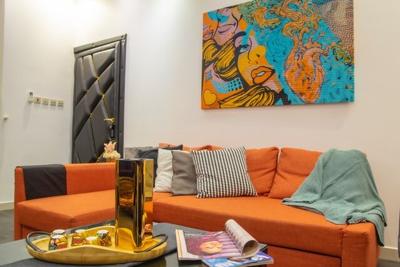
When considering soundproofing a room, there is one main question you need to ask yourself. Exactly how soundproof does the room need to be? Because if you want to limit the noise coming from certain rooms, that's one thing. But if you're going to entirely soundproof a room the way a music recording studio is soundproofed, that's a whole different kettle of fish.
Let's take a look at both options. Completely soundproofing a room is costly, and it's also really only necessary for professional pursuits, such as recording music. There are ways to do it, of course, but you need to commit to the task due to the cost and work involved.
There is plenty of cheaper solutions to block most of the noise coming from a room. So, that might be the way to go for the average household. Here are some of the best tips for soundproofing a room in your home.
Studio quality acoustic panels
If you're serious about blocking sound from a room, you can buy acoustic wall panels. The panels are made from various materials, including soft foam rubber, dense polyester fiber, and even cork.
Bear in mind that these panels aren't designed to look good. They serve a purpose, but they're not very decorative. However, if you're going all out to create actual soundproof walls, this is the way to go. Besides, though, you'll need to consider the ceiling and floor. You can add panels to the ceiling, but it isn't much you can do about the floor except adding underfloor insulation.
You'll also want to ensure the floor is soft, using carpet or a series of rugs. This is important because sound vibrations bounce off any hard surfaces. So, timber flooring isn't going to work so well. If you have no choice but to keep hardwood floors, at least make sure you have something soft under any speakers or amplifiers because this will dampen the vibrations. If you go this way, you should also weatherstrip your doors to complete the soundproofing process.
The cheaper option
It might not look as professional and probably won't be quite effective, but any soft material works for the wall. Whether you hang blankets, tapestries, or even use large pieces of foam, you'll limit the noise. Again, this is because sound bounces around hard surfaces and amplifies. If you can soften the walls and ceiling in any way possible, you'll still get a similar effect.
Acoustic insulation
Another way to dampen the sound in your house is with soundproof insulation. If your household insulation needs an update anyway, it's worth investing in the best products available. Choosing insulation that's highly rated for acoustic performance will help keep the noise where it belongs.
Best of all, insulation goes in walls, in the ceiling, and under the floor. So, you don't even see it, but it still does the required job. Even if you don't want a fully soundproofed room, acoustic insulation is a great idea. You'll even make the home more comfortable and save money on energy bills!



(0) comments
We welcome your comments
Log In
Post a comment as Guest
Keep it Clean. Please avoid obscene, vulgar, lewd, racist or sexually-oriented language.
PLEASE TURN OFF YOUR CAPS LOCK.
Don't Threaten. Threats of harming another person will not be tolerated.
Be Truthful. Don't knowingly lie about anyone or anything.
Be Nice. No racism, sexism or any sort of -ism that is degrading to another person.
Be Proactive. Use the 'Report' link on each comment to let us know of abusive posts.
Share with Us. We'd love to hear eyewitness accounts, the history behind an article.